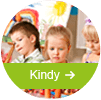Overstimulation in Babies and Young Children
Although many books and professionals advise that your baby and younger child needs plenty of stimulation to help them learn, it is possible to go too far.
In such cases, your child might experience what’s known as “overstimulation fatigue”.
Babies’ and children’s capacities are limited
Even as adults, we know the experience of suddenly feeling mentally “swamped”. That might happen if we’re overloaded at work, have several people trying to talk to us at the same time while the phone is ringing and our email is also pinging away.
In those situations, we quite often need to just drop everything and go for a ‘time out’ where we remove ourselves to a quieter place to recover our equilibrium.
Babies have a much smaller capacity to absorb multiple stimulation sources (and experiences) over a short period of time. So, they hit exactly the same wall as adults do only it happens faster, they’re less able to understand what’s happening to them and they also can’t easily verbalise their feelings.
Although their capacity to absorb multiple concurrent stimuli will have increased enormously by say the age of 3-4, they can still easily get swamped by too much going on at one time.
This is called “overstimulation”.
Symptoms
When babies see, hear and feel more things happening than they can cope with over a short period of time, they’ll usually react. You might see them:
- Turn away and not pay attention to you;
- Fidget and start to move in jerky uncontrolled motions;
- Get angry and start to ‘grizzle’ or cry;
- Look alarmed;
- Throw a temper tantrum;
- Refuse to play with their toys;
- Stop eating.
If the child is at pre-school age, you might also see:
- Them being difficult for no obvious reason (e.g., refusing to use their cutlery);
- Looking tired and bored;
- Possibly being more fractious and even aggressive than usual;
- Saying “I don’t want to” to almost every proposition;
- Becoming unusually ‘clingy’.
What you should do
Almost irrespective of the age of your child, the following might be advisable:
- Leave them quiet for a period of time. Don’t fuss them or try to find things for them to do;
- Ask (or take) them to go into a room or location where they can have some peace and quiet and a time to recover their composure;
- A cuddle in that quiet place can work wonders;
- If it’s possible to do so, try to reduce the light and visual stimulation they’re experiencing. Partly close the curtains or pull the sunshade over their pram/pushchair;
- In the case of older children, make sure the calming-down period is and free of technology such as games TV – even if they’re asking for it. Something like a book would be ideal, as would drawing or a snooze (it can be difficult to distinguish between overstimulation and plain tiredness);
- If they’re playing with other children, separate the two groups to ensure your child gets the break they need.
Most babies and children will recover very fast – particularly if their break has included a brief nap.













